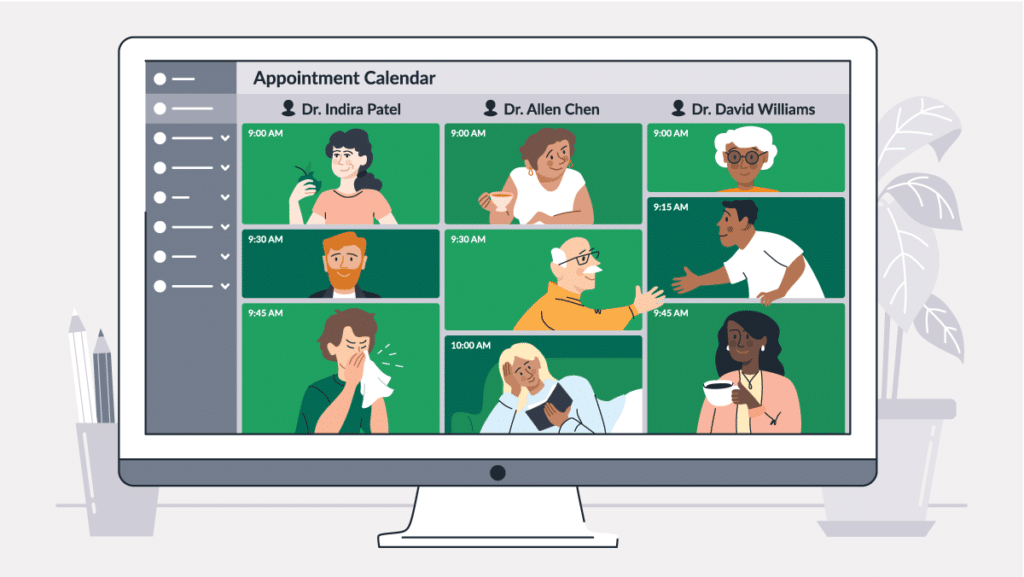
Patient engagement is a partnership with your patients to achieve the best possible health outcomes through empowerment and communication. It’s a joint effort, and that means joint benefits too.
When you work to improve engagement with your patients, you’re also creating more opportunities for practice growth.
Here’s some of the reasons it’s so important to invest in patient engagement when you’re setting growth goals.
1. Fewer missed appointments
It’s hard to grow as a business when your appointment schedule is full, but your practice isn’t.
Last minute cancellations and no shows can be a huge inconvenience, from missed revenue to broken productivity. There’s no way to stop those altogether, but you’ll find it less common the more engaged your patients are.
If a patient is really engaged, they have a better understanding of the need for your services. That means they’re less likely to miss their appointments and more likely to be proactive if they do need to reschedule.
If you can remove that obstacle, you’re clearing the path for growth to take on new forms. Will you bring in a new specialty? Bring on extra practitioners? Even open a new location? When you’ve got a more predictable income stream, you can start to think bigger.
2. Get more done, faster
There’s a few ways patient engagement can actually improve your efficiency.
First up, it can streamline each appointment. The more your patients are actively involved in their health, the more prepared they’ll be for each visit. Engaged patients are more likely to track their symptoms, changes to their behaviour or lifestyle, or have some questions prepared. It means you can get right to the crux of the issue, and spend less time just trying to get the information you need from them.
As a practitioner, you can help keep the ball rolling by taking notes about their lifestyle, hobbies, and preferences. When the time comes to make a suggestion, you’ll already have an idea of what might work best for them.
You’ll spend less time chasing the patients for recalls and convincing them to take up preventative measures. If you’ve automated some of these processes, even better! Using technology to streamline patient engagement gives your team more time back while also improving care.
All of that saved time can be funnelled back into finding and applying new ways to grow your practice.
3. Improved health outcomes for your patients
The wellbeing of your patients is always a priority, which is why patient engagement needs to be one too.
Studies show that engaged patients have better health outcomes. Better health outcomes are the best result we can hope for and they benefit everyone in the process, including your practice.
Your practice won’t grow unless patients feel they are getting what they need from their appointments. That means improving outcomes for your existing patients is key to growing the practice. Patients who can see the great results are more likely to develop loyalty with you, to recommend your practice, to leave rave reviews on Google, and more.
Which brings us to the next point.
4. Engaged patients are your best advocates
One of the reasons patient satisfaction and loyalty is so important is that those patients are more likely to recommend your practice to their family and friends.
It’s important to avoid getting caught up in the New Patient Myth, thinking that more new patients are the secret to unlocking growth. New patients only make up about 9% of your appointments, and up to 33% will find you through word-of-mouth.
Recommendations from fellow patients, whether through reviews or trusted friends, are one of your best tools for attracting new patients. Focus your efforts on them, and they’ll generate growth for you. Better yet, it’s the type of marketing that money can’t buy, so you’ll have more funds to go towards development for your practice and staff.
5. Keeps your patients coming back
The more you focus on engaging your patients, the more loyal they’ll be to your practice. Patient engagement can help to foster trust, see better results, and keep patients on top of their health needs. All of those things are going to build up that sense of loyalty with your practice.
Existing patients make up 91% of your appointments, and word-of-mouth is your best source for bringing in new ones. Focusing on building loyalty with your existing patients is an integral part of growing your practice.
6. Patients can make informed decisions
Engaged patients take an active role in their health and are really invested in the process as well as the outcome. So when it comes time to make decisions about treatments, engaged patients make your life easier.
It could be an understanding that spending a bit more on treatment now will give them much better results in the long term. It might be that they make decisions faster because they’ve thought ahead about how those options will fit into their lifestyle. Or it might just mean they pay closer attention to your discussion.
7. Confident patients are more proactive and receptive
Engaged patients are more proactive about their health.
Why is that good for you? It means they’re more likely to be receptive to your suggestions, and more likely to engage in preventative health measures. That means they’re getting the best care, and it also gives your practice potential for specialties, better take up of preventative services, and more.
If you can find additional services that suit your patient demographics, and engage those patients in their health, the specialties will be a lot more successful.
Engagement is a team effort
Engaging your patients is a great way to strengthen your growth goals, but it is a team effort. Each member of your team and each patient can play a role in improving patient engagement, so it’s important to have open discussions about it.
Make sure your patients are empowered to understand their own role so they can get on board as soon as possible. And make sure your staff understand the importance of patient engagement. Keep it in their focus at each stage of the patient journey, and show them what you have to gain from it.



